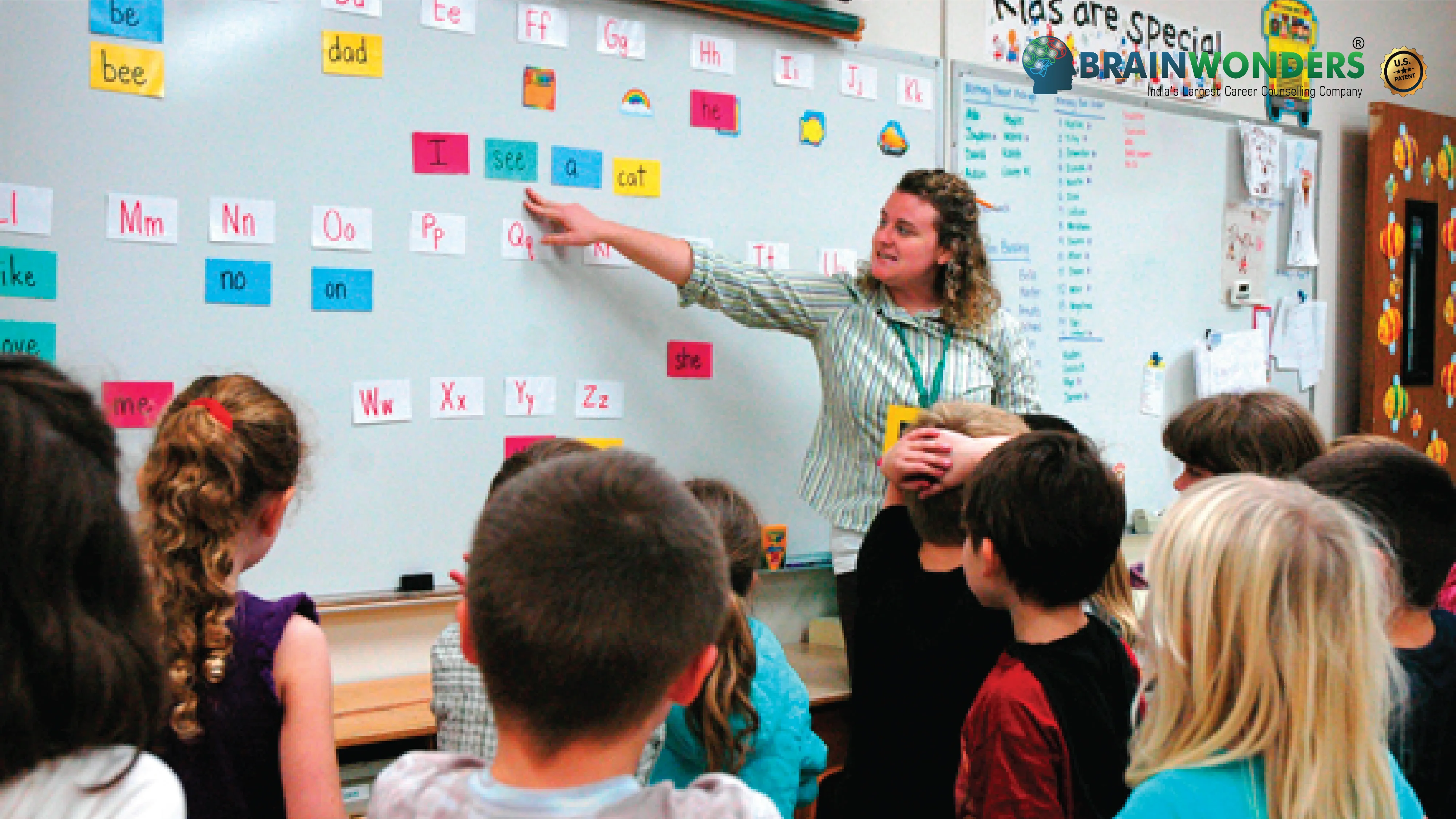How to become a Preschool Teacher
Overview, Courses, Exam, Colleges, Pathways, Salary

Overview
Who is Preschool Teacher ?
A preschool teacher is an educator who specializes in teaching young children, typically between the ages of three and five years old. These teachers play a vital role in a child's early education and development by creating a nurturing and stimulating learning environment. They introduce young learners to basic academic concepts, social skills, and essential life skills. Preschool teachers design and implement age-appropriate lesson plans that promote cognitive, physical, social, and emotional development.
They engage children in various activities, including arts and crafts, storytelling, music, games, and outdoor play. Preschool teachers observe and assess children's progress, identify areas of strength and areas needing improvement, and provide individualized attention and support. They also foster a positive classroom environment, encourage social interaction, and help children develop skills such as sharing, cooperation, and problem-solving.
Additionally, preschool teachers collaborate with parents or guardians to provide updates on a child's development and discuss any concerns or challenges. They may also work closely with other professionals, such as speech or occupational therapists, to support children with special needs. Preschool teachers must be patient, compassionate, energetic, and creative, as they play a critical role in shaping a child's early educational experience and fostering a love of learning.
Typical day at work
What does Preschool Teacher do?
- Lesson Planning: Preschool teachers develop and implement age-appropriate lesson plans that promote children's intellectual, social, and emotional development. They design activities and educational experiences that stimulate learning and cater to the needs of individual students.
- Classroom Management: Preschool teachers create a safe and nurturing environment where children can learn and play. They establish routines, manage behaviour, and ensure a positive and inclusive classroom atmosphere.
- Instruction and Facilitation: They deliver lessons and facilitate engaging activities that promote cognitive, physical, social, and emotional development. This includes teaching basic concepts such as numbers, letters, colours, and shapes and encouraging creativity and exploration.
- Assessments and Progress Monitoring: Preschool teachers assess students' development and progress through observation, informal assessments, and documentation of milestones. They keep records of individual achievements and identify areas that may need additional support or intervention.
- Individualized Support: Preschool teachers provide individualized attention and support to children with diverse learning needs, including those with special needs or developmental delays. They adapt teaching strategies and materials to meet individual student requirements.
- Parent Communication: They maintain open and effective communication with parents or guardians, sharing updates on their child's progress, addressing concerns, and providing suggestions for activities to reinforce learning at home.
- Collaboration: Preschool teachers often collaborate with other educators, support staff, and professionals, such as speech therapists or occupational therapists, to ensure the holistic development of children and address specific needs.
Abilities and Aptitude needed
What are the skills, abilities & aptitude needed to become Preschool Teacher?
- Patience and Empathy: Preschool teachers must have a patient and empathetic nature to understand and respond to the needs of young children. They should be able to provide a nurturing and supportive environment for their students.
- Communication Skills: Effective communication is crucial for preschool teachers to engage with children, parents, and other educators. They should be able to communicate clearly, listen actively, and convey information age-appropriately.
- Creativity and Flexibility: Preschool teachers should possess creative thinking skills to develop engaging and interactive lesson plans. They need to be adaptable and flexible in their teaching methods, adjusting to individual children's learning styles and needs.
- Organizational Skills: Strong organizational skills are necessary to plan and manage daily activities, create lesson plans, and maintain records. Preschool teachers must be able to manage their time effectively and handle multiple responsibilities.
- Classroom Management: Preschool teachers should be able to create a structured and positive classroom environment. They must be skilled in managing behaviour, resolving conflicts, and promoting community among young learners.
- Knowledge of Child Development: Child development principles and milestones are essential for preschool teachers. They should be familiar with age-appropriate learning objectives, social and emotional development, and cognitive abilities of young children.
- Teamwork and Collaboration: Preschool teachers often work as a team, collaborating with other educators, support staff, and parents. They should be able to communicate and cooperate effectively to create a cohesive and harmonious learning environment.
- Adaptability to Diversity: Preschool teachers work with children from diverse backgrounds, cultures, and abilities. They should have respect for diversity and be able to create an inclusive classroom that celebrates and respects individual differences.
- Passion for Early Childhood Education: A genuine love for working with young children and a passion for early childhood education are essential for preschool teachers. They should be enthusiastic about fostering the growth and development of young learners.
Salary
Salary for Preschool Teacher?
Salary for Preschool Teachers is as follows :
- Minimum Monthly Salary: For entry-level Preschool Teachers or those with limited experience, the monthly salary might range from INR 20,000 to INR 30,000 or more.
- Maximum Monthly Salary: Highly experienced and skilled Preschool Teachers, especially those with advanced qualifications or working in senior positions, may earn a monthly salary ranging from INR 40,000 to INR 60,000 or more.
- Annual Salary: The annual salary for entry-level Preschool Teachers could be approximately INR 2.4 lakhs to INR 3.6 lakhs per year. Experienced and well-qualified Preschool Teachers may earn a maximum yearly salary ranging from INR 4.8 lakhs to INR 7.2 lakhs or more.
- Highest-Paying Jobs and Scope: The highest-paying jobs for Preschool Teachers are often found in well-established private preschools, international schools, and prestigious educational institutions. Teachers with additional certifications, advanced degrees, and specialized training in early childhood education may command higher salaries. They may have opportunities for career growth into leadership or administrative roles within preschools.As the demand for quality early childhood education continues to grow, there will be a sustained need for skilled and passionate Preschool Teachers. These educators play a crucial role in laying the foundation for children's academic and personal development during their formative years.
Pathways
How to become an Preschool Teacher?
Entrance Exam
Entrance Exam for Preschool Teacher ?
Courses
Which course I can pursue?
Best Colleges
Which are the best colleges to attend to become an Preschool Teacher?
Industries
Which Industries are open for Preschool Teacher?
- Public and Private Schools: Preschool teachers can work in public and private elementary schools that offer preschool programs as part of their curriculum.
- Early Childhood Education Centers: Preschool teachers are in demand in standalone early childhood education centres that cater to young children, providing comprehensive early learning programs.
- Childcare Centers: Many childcare centres include preschool programs within their services. Preschool teachers can work in these centres, providing education and care to children before they enter formal schooling.
- Nonprofit Organizations: Nonprofit organizations may operate early childhood education programs or offer support services to families and young children, providing opportunities for preschool teachers.
- Community Centers: Community centres often offer preschool programs to serve the local community's needs. Preschool teachers may be employed in such centres to provide early childhood education.
- International Schools: International schools may have preschool divisions to cater to the needs of expatriate families. Preschool teachers with experience and qualifications in early childhood education may find opportunities in these institutions.
- Private Tutoring and Homeschooling: Some preschool teachers may work as private tutors or provide homeschooling services, offering individualized education to young children.
- Online Education Platforms: With the growth of online education, preschool teachers may have opportunities to provide virtual instruction and create educational content for online early learning programs.
internship
Are there internships available for Preschool Teacher?
- Teacher Preparation Programs: Many colleges and universities offer teacher preparation programs that include supervised field experiences. These programs provide aspiring teachers with opportunities to observe and assist experienced preschool teachers in real classroom settings.
- Practicum or Student Teaching Placements: As part of their formal education, preschool teacher candidates often complete practicum or student teaching placements in preschool settings. These placements provide hands-on experience under the guidance of mentor teachers.
- Volunteering or Assisting in Preschools: Volunteering or assisting in preschools, early childhood centers, or childcare facilities can offer valuable experience and insights into working with young children. Such opportunities may involve assisting teachers, engaging in activities with children, and observing classroom dynamics.
- Summer Camps or Enrichment Programs: Working as a counselor or assistant in summer camps or enrichment programs for young children can provide exposure to the preschool teaching environment and opportunities to practice educational and behavioral management skills.
- Community Outreach Programs: Some community organizations or nonprofit groups may offer internship-like programs where individuals can gain experience in early childhood education by assisting with community-based preschool initiatives.
Career outlook
What does the future look like for Preschool Teacher?
The future for preschool teachers looks promising, driven by the growing recognition of the importance of early childhood education. Increasing awareness of the long-term benefits of quality preschool programs will likely lead to expanding the field. With a rising emphasis on early education, there will be a demand for skilled and qualified preschool teachers. Additionally, the focus on providing inclusive education and support for children with special needs will create opportunities for teachers with specialized training. The need for nurturing, competent, and passionate professionals in early childhood education is expected to remain strong, making preschool teaching a fulfilling and rewarding career choice.







